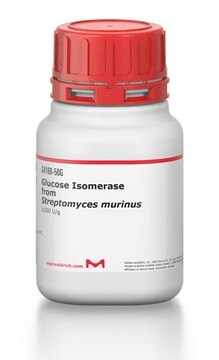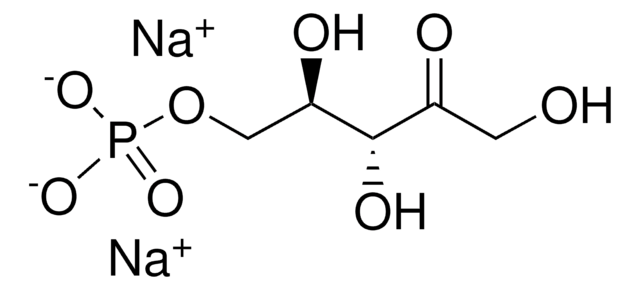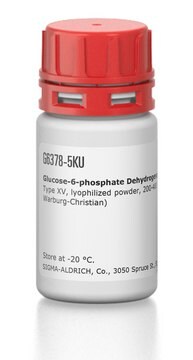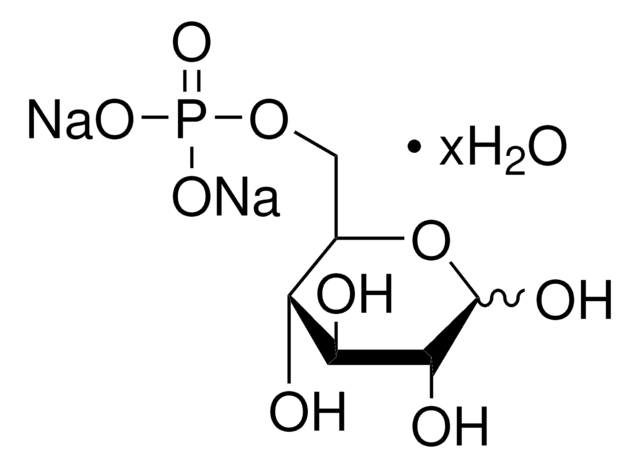SAE0005
Glucose-6-phosphate Isomerase human
recombinant, expressed in E. coli
Sinónimos:
GPI, PGI
Iniciar sesiónpara Ver la Fijación de precios por contrato y de la organización
About This Item
Productos recomendados
recombinant
expressed in E. coli
Quality Level
assay
≥95% (SDS-PAGE)
specific activity
≥200 units/mg protein
storage temp.
−20°C
Biochem/physiol Actions
Glucose-6-phosphate isomerase (GPI) is a homodimeric enzyme ubiquitously present in most organisms. GPI catalyzes the interconversion between glucose-6-phosphate and fructose-6-hosphate, the second step of the glycolytic pathway. In mammals, Glucose-6-phosphate isomerase also acts as an autocrine motility factor (AMF), a neuroleukin, and a maturation factor. GPI deficiency is the second most common erythroenzymopathy of glycolytic enzymes after pyruvate kinase deficiency. Inherited deficiency of the enzymatic activity of GPI causes hereditary nonspherocytic hemolytic anemia (HNSHA) in humans, a severe deficiency that can be associated with hydrops fetalis (a-thalassaemia), immediate neonatal death, and neurological impairment.
Physical properties
C-terminal histidine-tagged
Unit Definition
One unit will convert 1.0 mmole of D-fructose 6-phosphate to D-glucose 6-phosphate per inute at pH 7.4 at 25 °C.
Physical form
Supplied as a solution in 50 mM Tris-HCl pH 7.5, and 50% glycerol
Storage Class
10 - Combustible liquids
wgk_germany
WGK 1
flash_point_f
Not applicable
flash_point_c
Not applicable
Certificados de análisis (COA)
Busque Certificados de análisis (COA) introduciendo el número de lote del producto. Los números de lote se encuentran en la etiqueta del producto después de las palabras «Lot» o «Batch»
¿Ya tiene este producto?
Encuentre la documentación para los productos que ha comprado recientemente en la Biblioteca de documentos.
Miao Xu et al.
Blood, 132(6), 622-634 (2018-05-26)
Thrombopoietin (TPO), a hematopoietic growth factor produced predominantly by the liver, is essential for thrombopoiesis. Prevailing theory posits that circulating TPO levels are maintained through its clearance by platelets and megakaryocytes via surface c-Mpl receptor internalization. Interestingly, we found a
Jose Maria Bastida et al.
Thrombosis and haemostasis, 117(1), 66-74 (2016-10-14)
Currently, molecular diagnosis of haemophilia A and B (HA and HB) highlights the excess risk-inhibitor development associated with specific mutations, and enables carrier testing of female relatives and prenatal or preimplantation genetic diagnosis. Molecular testing for HA also helps distinguish
Alice Fabarius et al.
Cancers, 14(12) (2022-06-25)
Soluble factors released from irradiated human mesenchymal stromal cells (MSC) may induce genetic instability in human CD34+ cells, potentially mediating hematologic disorders. Recently, we identified four key proteins in the secretome of X-ray-irradiated MSC, among them three endoplasmic reticulum proteins
Lee-Chun Su et al.
ACS nano, 8(10), 10826-10836 (2014-09-16)
The endothelium monolayer lining in the luminal side of blood vessels provides critical antithrombotic functions. Damage to these cells will expose a highly thrombogenic subendothelium, which leads to pathological vascular changes. Using combined tissue engineering and ligand-receptor targeting strategy, we
Yunmei Wang et al.
Nature communications, 8, 15559-15559 (2017-05-31)
Inflammation and thrombosis occur together in many diseases. The leukocyte integrin Mac-1 (also known as integrin α
Nuestro equipo de científicos tiene experiencia en todas las áreas de investigación: Ciencias de la vida, Ciencia de los materiales, Síntesis química, Cromatografía, Analítica y muchas otras.
Póngase en contacto con el Servicio técnico








